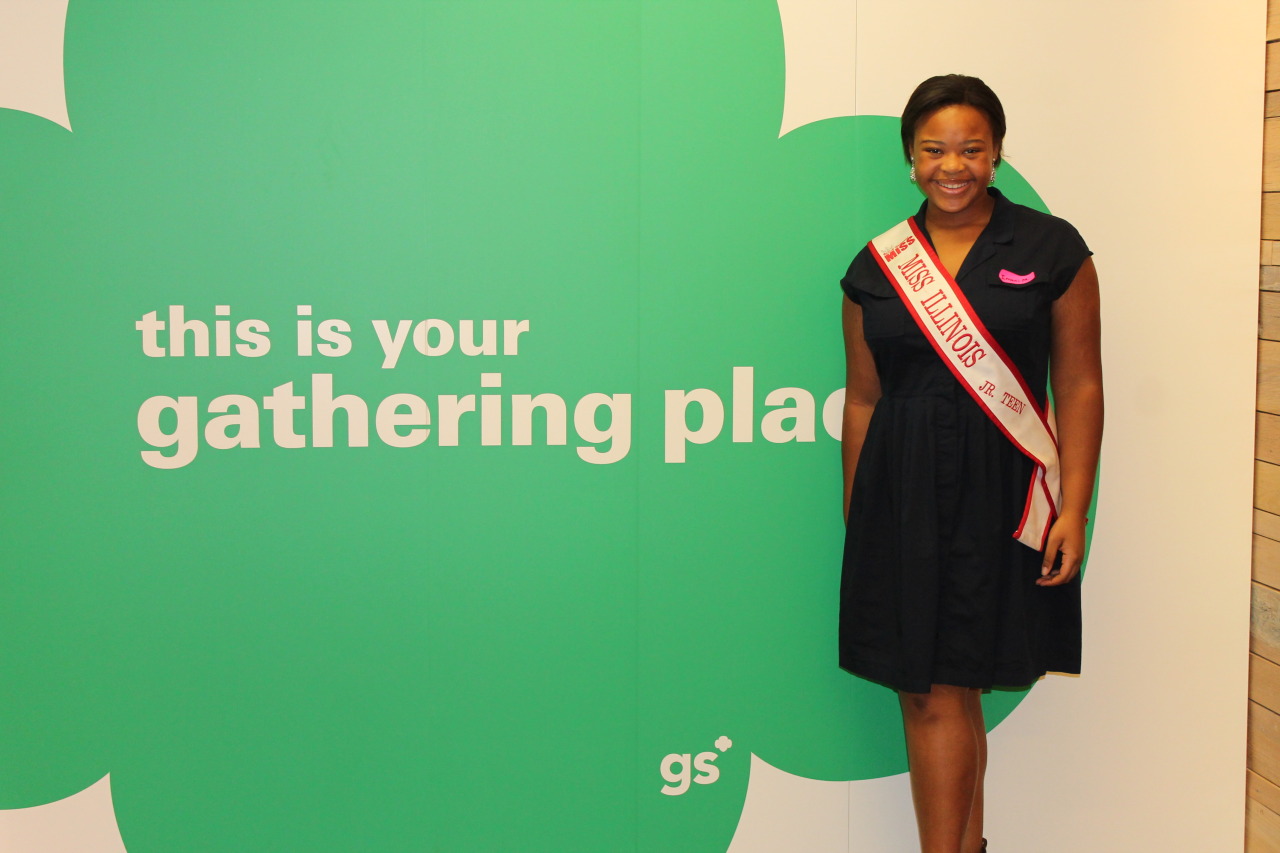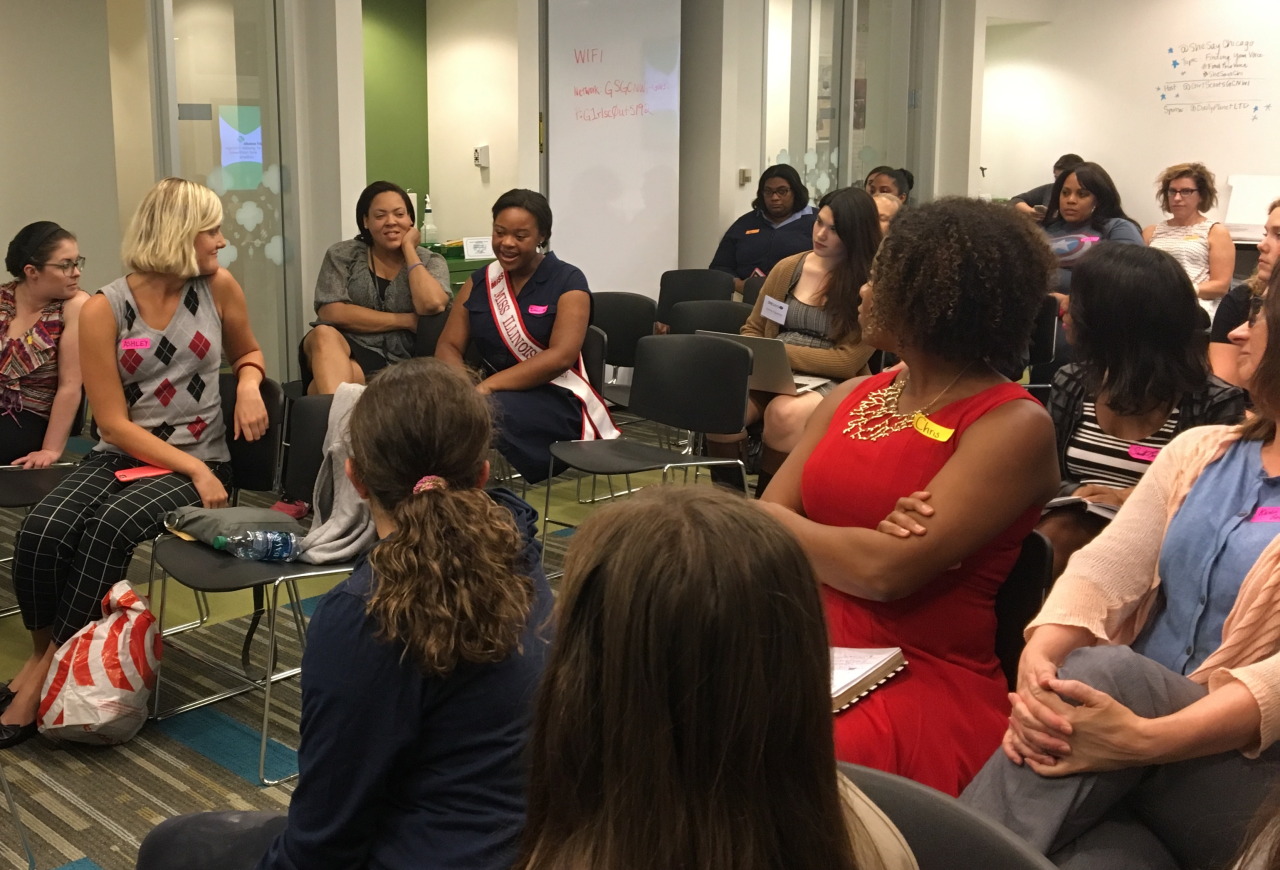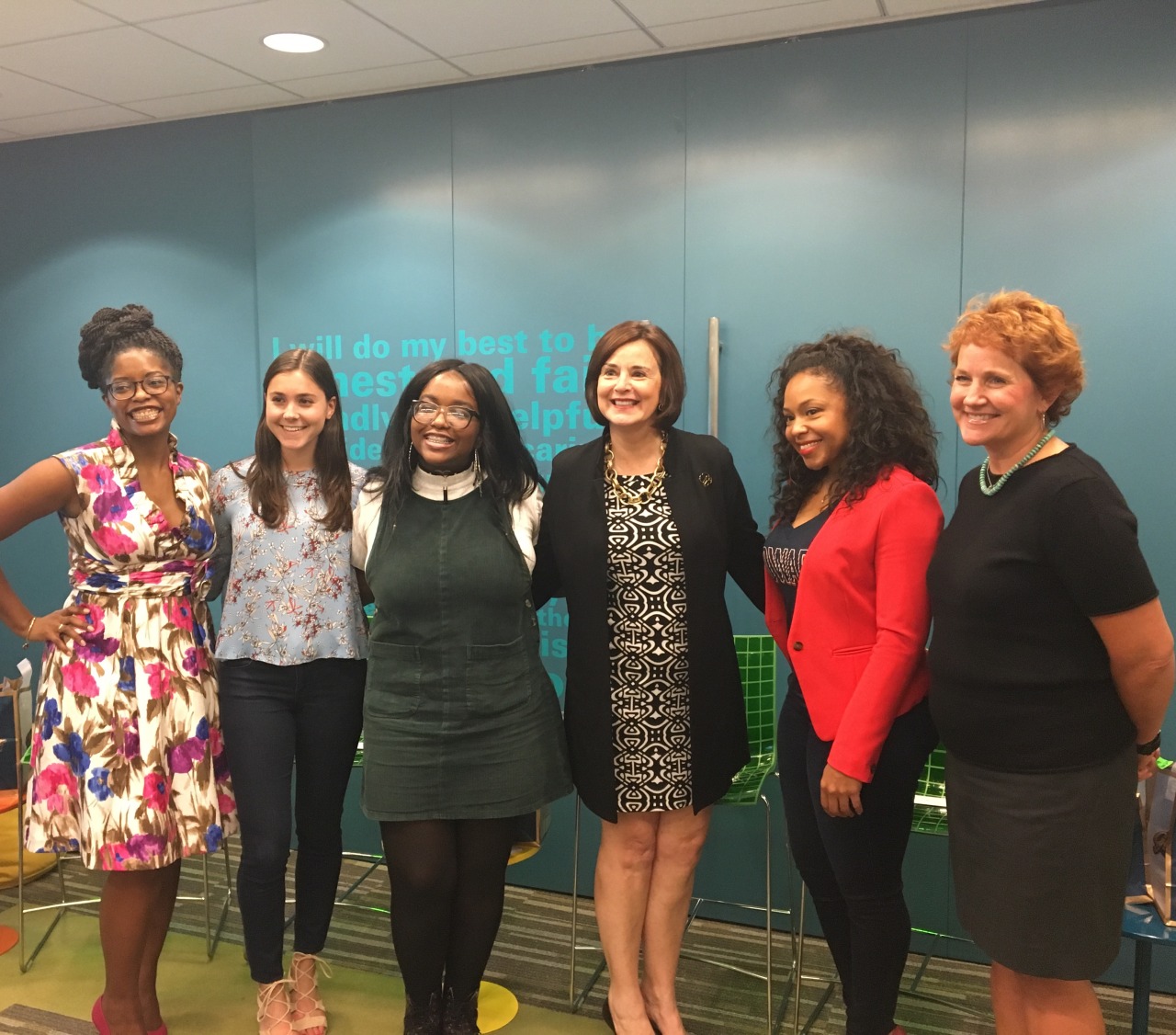October 7th, 2016
Chicago
Finding Your Voice – Courage, Confidence and Character
Held at: Girl Scouts of Greater Chicago and Northwest Indiana corporate office
We all know we have a voice, but what does it feel like to truly “find” it? How do we use our voices whether we’re in a classroom or a boardroom? These and more questions were answered last Wednesday night by experienced, tenacious women who have “been there” and the audience – including Girl Scouts – who are purposefully learning their way.
Moderator and Girl Scouts media relations manager L’Oreal Thompson Payton is a media and marketing professional and former journalist with a passion for empowering young women. ?Follow her on Twitter and Instagram.
Panelists included:
• Kelly Fair, founder at Polished Pebbles?. Follow her on Twitter and Instagram.
• Eva Lewis, Girl Scouts Ambassador, founder of The I Project. Follow her on Twitter and Instagram.
• Jacqueline Perlman, founder and CEO of My Favorite Outfit. Follow her on Twitter and Instagram.
• Nancy Wright?, CEO of Girl Scouts of Greater Chicago and Northwest Indiana. Follow her on Twitter.
• Jeannine Ringland Zwirn, Sales, Marketing and Business Development at Daily Planet Ltd. Follow her on Twitter and Instagram.
So, tell us – how did you find your voice?
Nancy Wright: I was pretty young age. My parents were really influential.
Jeannine Ringland Zwirn: I’ve realized I find my voice in multiple times and moments in life. We change as we experience things, so you have to keep rediscovering your voice.
Jacqueline Perlman: I found mine when I was getting my MBA in management.
Karen Fair: I found mine pretty early – around 3rd to 5th grade, but then I lost it.
Eva Lewis: I found my voice in high school. Now I find it just by knowing what I like and expressing my interests.
Have any of you experienced camouflaging?
According to a recent study by Girls Inc., 74% of girls in grades 3-12 said they are under pressure to please everyone; 55% believed girls are expected to speak softly and not cause trouble. “Camouflaging” describes the critical years during a teen girl’s life when she hides her true self from herself, her friends and family.
KF: Yes. At my old school, I loved to raise my hand and felt good about being smart. Then I transferred to a new school. There were no uniforms, so my clothes weren’t “right”. My hair wasn’t right, either. I just didn’t want to bring attention to myself. The difference for me began with Essence magazine. The “Essence Ladies” had great careers, so I wanted to become one of them. I worked half-days at the onsite beauty college at Essence corporate. The Essence ladies mentored me and broke me out of my shyness. I had to work the cash register, so there was no way I could be quiet or invisible! They pushed me – in a good way – and helped me to regain my confidence.
JRZ: Yes. I worked in sales for almost 20 years. I recall around year 17, I arrived at a client meeting but this time, the regional president and vice president were there. I literally let them “sit at the table” – for some reason, I didn’t sit with them. I sat elsewhere. I couldn’t believe I did that. I know better now.
JP: Yes, even now. I’ll be thinking about something, but am too nervous to say it. I’ve been challenging myself in school. I say to myself, “Tonight, I’m going to speak up once, then twice.” The more I challenge myself, the less I camouflage.
Special Guest: Imani Muse, USA National Miss Illinois Jr Teen 2016: Yes. I witnessed a difference in my friend when she changed schools, and it wasn’t good. Her situation encouraged me not to camouflage as it diminishes you as a person. My mom inspired me to find my voice; when I got involved in pageantry, I found it. Today, my platform is “power of the voice”. Together, we can make many statements better than any one person can. When we see how powerful women can be, it inspires all of us to be better.

NW: Yes. Earlier in my career, I wasn’t as strategic and didn’t navigate the corporate culture as well as I could have. I should’ve been more aggressive. I worked for a multibillion dollar company, and was one of the few women “at the table”. It was there where I realized the different communication styles between men and women. I got to know the men as individuals, not as one large group of men. I’m glad to pass on what I’ve learned to you. Remember the audience is always different. Just because you can “read” the audience doesn’t mean you compromise what you’re saying.
EL: Yes, and I’ve been a Girl Scout for 10 years (Eva is 17). I’m an activist and an artist. I started a non-profit, intersectional art collective. I go to a mostly white private school on the north side of Chicago. I’m a black girl from the south side. I couldn’t speak. Anything I said was a dagger. I had two options in high school: I could camouflage or I could be comfortable and content. My courage came from a form of a fish bowl with one resource and hundreds of fish – I had to go straight into the school of fish. My voice was there; it just had to use it.
Is there a certain way of speaking to show others you’ve discovered your voice?
NW: When you believe in yourself, it shows without needing words. You just know. Everyone in this room tonight is amazing and brilliant. We’re all different. We all bring our gifts to the world. Don’t think twice about doubting that.
JRZ: Absolutely, be yourself. Take time to know yourself and be confident in that. Make sure you also make time to reflect: “What did I do right or wrong?” “What can I learn from it?”
KF: I love pauses. I like to say, “Let it sizzle.” Whether you sing a note or say a word, in your mind, say, “I’m gonna let you think about it.” I just stand still andI just wait. It’s a nice, quiet way to be assertive. Even when you’re nervous or scared, remember you practiced for this moment, so just give yourself a second. Find your inner Sasha Fierce!
EL: I’ve organized peaceful protests, even when people thought I was too young. Two thousand people showed for the first protest. A man came up to us and thought he was “helping” our cause. This guy was actually trying to change how we spoke so he could relate. We learned something that day: we tend to figure out how to adapt to a situation; we can’t expect the situation to adapt to us? Why can’t we claim what we’ve already done? Why do we have to lower our voices?

Who is the mentor or person who inspired you to use your voice?
KF: My first boss out of school – Linda Shepherd. She said we don’t have to think about things in only one or two ways. We have to find our voice in many situations. Linda also helped me to predict behavior, meaning people come from different perspectives, careers, etc. I remember hearing about an open seat on the board of my church. I was the youngest by several years and thought I’d never have a chance. Linda encouraged me to run for the seat and I won! I learned there’s room for authenticity, but time for prediction and game. I have to know my audience if I’m going to sell to them properly. Practice how to pivot and engage your audience. It takes time, but you’ll gain confidence with every situation.
NW: My parents. My first summer job was lifeguarding. Our staff consisted of one other young woman and the rest were guys. She and I found out the guys were making three dollars more an hour. We decided to meet with manager and ask to be paid the same. He said, “That’s what I pay.” We said, “That’s not right.” We told our parents, and they supported our decision to speak up. Unfortunately, we didn’t get our raise. She and I were actually treated worse for the rest of the summer, but we didn’t quit. That experience taught me about equality and why it was – and is – so important to be in my role today to advocate for women.
EL: My mom. She has a B.S. in business from NIU, which was considered good at the time. When her company moved to the suburbs, she had two options: transfer us to new schools or quit her job. She quit her job. She hasn’t found a job at that level since, but I’m reaping the benefits of her sacrifice. It’s the symbolism of that sacrifice that drives me. She thought she was doing something for one thing. Now we’re taking the journey together.
JRZ: My parents. Mom was working hard to get her Ph.D; my dad helped around the house and in the kitchen. I watched both of them help each other and neither of them never questioned their “assigned” roles. It was such a great experience watching them, and I want my two girls (who are also Girl Scouts) to see that in our house.
JP: Yep, my parents, too. I was fortunate to go to great schools thanks to them, but none of it sunk in until I found something I was passionate about. I worked on a non-profit on south side. I realized the passion I had to help people was forcing me to speak up. Sometimes it’s what you say, not how much you say. I’ve learned to speak my opinion, listen carefully, then respond without being worried about what comes next.

How are you using your voice in your current role?
JP: We started a My Favorite Outfit after-school program – 20 girls, mostly high schoolers, to make the transition from high school and college less scary. We’re getting them ready for college fashion programs and for college-level courses. We’re also mentoring them with real fashion industry workers.
NW: Even though I got to the top of my profession,I didn’t have a definite career trajectory. You always have to go with your heart, and I knew I wasn’t balancing my personal and professional life as well as I could. My advice: learn from the process, even if it’s uncomfortable. Before he passed away, my father reminded me how it important it is to be able to define what I’ve done to make the world a better place. It’s all about awareness and paying it forward.
KF: We’re serving as many girls as we can at Polished Pebbles, making sure we have funding and using different tools to get the word out. I’ve recently written a book to help girls [“They Are All The Same Girl” http://polishedpebbles.com/book] and always mentoring young women to take my place. It’s important to prepare them to take over. Seeing women succeed is what it’s all about.
EL: I want to empower. Impact. Help. Advocate for what my people need and give back to the communities that have cultivated me. Recently, I worked on a big project that involved artists all over Chicago to counteract conventional beauty standards, and am speaking to the United Nations in October.
JRZ: After many years of traveling the country for a major telecom company I’m in a new career with very different challenges. Now I’m involved with design and creative production. Some days, I feel like I don’t know anything, so maybe I shouldn’t speak up as much, right? But that can’t be the only answer. I decided to listen while I learn. I’m absorbing things, and it’s been awesome.
Thank you to our host Girl Scouts of Greater Chicago and Northwest Indiana for hosting this inspiring event. L’Oreal led the charge on the topic, creating an engaging conversation for women of all ages. We would also like to thank our sponsor The Daily Planet, a Chicago design, animation and production studio, for providing food and drink for this event.
Join us on 10/20 for our next SheSays Chicago discussion: Social and the Sexes – Do Men and Women Do Social Differently? Tickets will be available on October 6 at eventbrite.com.
Thank you to Anne Hagerty of the SheSays committee for the recap.